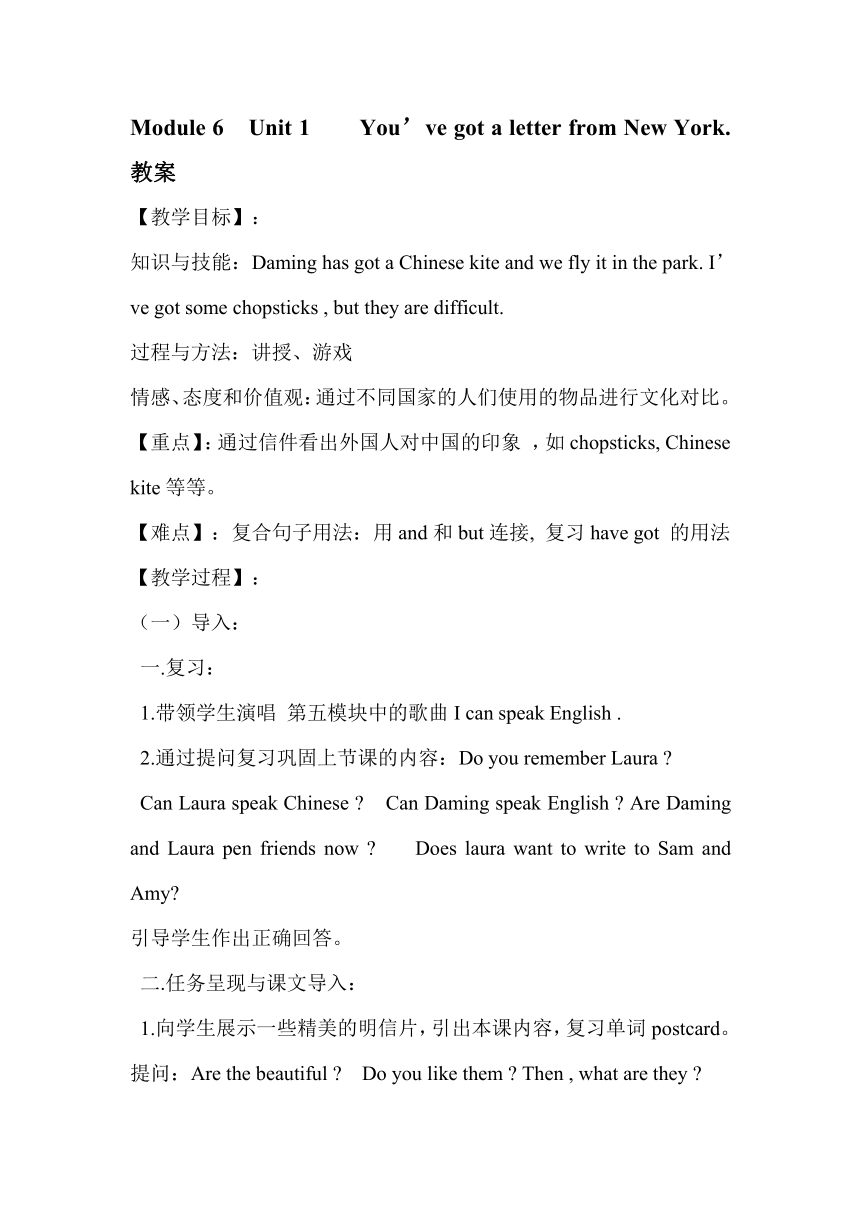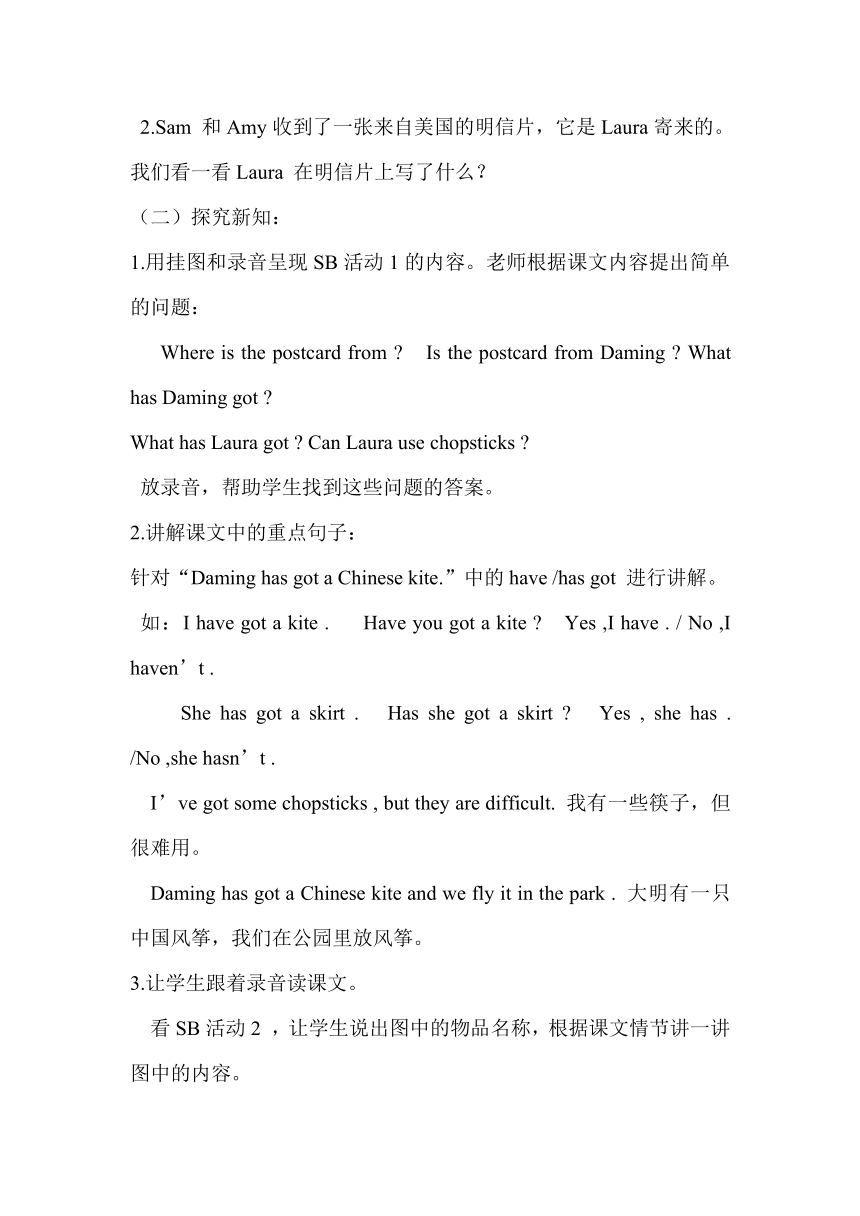Unit 1 You've got a letter from New York 教案
文档属性
| 名称 | Unit 1 You've got a letter from New York 教案 |

|
|
| 格式 | zip | ||
| 文件大小 | 15.7KB | ||
| 资源类型 | 教案 | ||
| 版本资源 | 外研版(三年级起点) | ||
| 科目 | 英语 | ||
| 更新时间 | 2017-09-15 00:00:00 | ||
图片预览


文档简介
Module
6
Unit
1
You’ve
got
a
letter
from
New
York.教案
【教学目标】:
知识与技能:Daming
has
got
a
Chinese
kite
and
we
fly
it
in
the
park.
I’ve
got
some
chopsticks
,
but
they
are
difficult.
过程与方法:讲授、游戏
情感、态度和价值观:通过不同国家的人们使用的物品进行文化对比。
【重点】:通过信件看出外国人对中国的印象
,如chopsticks,
Chinese
kite等等。
【难点】:复合句子用法:用and和but连接,
复习have
got
的用法【教学过程】:
(一)导入:
一.复习:
1.带领学生演唱
第五模块中的歌曲I
can
speak
English
.
2.通过提问复习巩固上节课的内容:Do
you
remember
Laura
Can
Laura
speak
Chinese
Can
Daming
speak
English
Are
Daming
and
Laura
pen
friends
now
Does
laura
want
to
write
to
Sam
and
Amy
引导学生作出正确回答。
二.任务呈现与课文导入:
1.向学生展示一些精美的明信片,引出本课内容,复习单词postcard。提问:Are
the
beautiful
Do
you
like
them
Then
,
what
are
they
2.Sam
和Amy收到了一张来自美国的明信片,它是Laura寄来的。我们看一看Laura
在明信片上写了什么?
(二)探究新知:
1.用挂图和录音呈现SB活动1的内容。老师根据课文内容提出简单的问题:
Where
is
the
postcard
from
Is
the
postcard
from
Daming
What
has
Daming
got
What
has
Laura
got
Can
Laura
use
chopsticks
放录音,帮助学生找到这些问题的答案。
2.讲解课文中的重点句子:
针对“Daming
has
got
a
Chinese
kite.”中的have
/has
got
进行讲解。
如:I
have
got
a
kite
.
Have
you
got
a
kite
Yes
,I
have
.
/
No
,I
haven’t
.
She
has
got
a
skirt
.
Has
she
got
a
skirt
Yes
,
she
has
.
/No
,she
hasn’t
.
I’ve
got
some
chopsticks
,
but
they
are
difficult.
我有一些筷子,但很难用。
Daming
has
got
a
Chinese
kite
and
we
fly
it
in
the
park
.
大明有一只中国风筝,我们在公园里放风筝。
3.让学生跟着录音读课文。
看SB活动2
,让学生说出图中的物品名称,根据课文情节讲一讲图中的内容。
(三)巩固新知:
用录音呈现SB活动1的内容。老师根据课文内容提出简单的理解性问题,例如:“Where
is
the
postcard
from
Is
the
postcard
from
Daming
What
has
Daming
got
What
has
Laura
got
Can
Laura
use
chopsticks ”等。在放录音,帮助学生找到这些问题的答案。
老师可以针对“Daming
has
got
a
Chinese
kite”中的“Chinese”和
“have
got”两项内容进行重点教学。老师可以出示中国传统物品,以此解释
“Chinese”,
例如:中国风筝、国结、中国旗袍、中国明信片等。老师一边展示—也向学生解释:“We
are
from
China.
We
are
Chinese
This
kite
is
from
China.
It’s
a
Chinese
knot.
Oh,
that’s
a
Chinese
dress.
And
these
are
Chinese
postcard.”
老师讲解句子“Darning
has
got
a
Chinese
kite
and
we
fly
it
in
the
park.”因为句子较长,学生读起来可能不是很顺利。师生可以一起做“clearer
and
fasted”
游戏。这个游戏的设计是为了帮助学生流利地说出句子.同时还要避免因为机械操练而使学生感到枯燥乏味。学生可以通过一遍遍的朗读理解句子间的关系。具体操作如下:老师将句子写在黑板上。全班学生听到老师说:
“
One,
two,
go!”后开始齐声朗读句子。老师随着学生朗读的节奏匀速在黑板上画直线,每朗读一遍就画一条直线。如此反复,直到速度最快为止。鼓励学生朗读得既要快又要清楚。
用简单的符号标明两个句子之间的并列关系:
“Daming
has
got
to
a
Chinese
kite
and
(→)we
fly
it
in
the
park.”
老师讲解句子“I’ve
got
some
chopsticks,
but
they
are
difficult.”
可以通过实物演示或是出示单词卡的方式复习单词“chopsticks”。由于学生已经在第三册书中接触过这个单词,他们应该不会感到陌生。
老师可以同时出示刀叉和筷子。向学生介绍说:“I’ve
got
some
chopsticks
and
I
use
them
everyday.
I’ve
got
a
knife
and
fork
but
I
can’t
use
them
well.”接着问学生:
“Can
you
use
knife
and
fork
well ”
最后,引导学生说出“I've
got
a
knife
and
fork
but
I
can’t
use
them
well”或是“I
haven’t
got
a
knife
and
fork
and
I
cant
use
them
well.”以此引导学生理解句子之间的关系。使用简单的符号来表示两个句子之间的转折关系。“I’ve
got
some
chopsticks,but
they
are
difficult.”
1.
活动一:
让每个学生带一件物品到学校来,以句型“I
have
got….”来描述自己拥有的东西。还可以将句型进行扩展。
如:I
have
a
bird.
She
can
sing
very
well.
I
have
a
violin,
but
I
can’t
play.
2.
活动二:
全班分为两组,分别站在教室的两边。教师分别发写有问题和答案的小纸条。一个学生读出问题,站在教室另一边的学生说出答案。两人即可坐回自己的座位。(这个活动需要两个小麦克风,以便让所有的学生都听见。)
(四)作业布置:
(五)小结:通过不同国家的人们使用的物品进行文化对比;
复习“have
got”的用祛
(六)板书设计:
Unit
1
Daming
has
got
a
Chinese
kite
and
we
fly
it
in
the
park.
I’ve
got
some
chopsticks
,
but
they
are
difficult.
6
Unit
1
You’ve
got
a
letter
from
New
York.教案
【教学目标】:
知识与技能:Daming
has
got
a
Chinese
kite
and
we
fly
it
in
the
park.
I’ve
got
some
chopsticks
,
but
they
are
difficult.
过程与方法:讲授、游戏
情感、态度和价值观:通过不同国家的人们使用的物品进行文化对比。
【重点】:通过信件看出外国人对中国的印象
,如chopsticks,
Chinese
kite等等。
【难点】:复合句子用法:用and和but连接,
复习have
got
的用法【教学过程】:
(一)导入:
一.复习:
1.带领学生演唱
第五模块中的歌曲I
can
speak
English
.
2.通过提问复习巩固上节课的内容:Do
you
remember
Laura
Can
Laura
speak
Chinese
Can
Daming
speak
English
Are
Daming
and
Laura
pen
friends
now
Does
laura
want
to
write
to
Sam
and
Amy
引导学生作出正确回答。
二.任务呈现与课文导入:
1.向学生展示一些精美的明信片,引出本课内容,复习单词postcard。提问:Are
the
beautiful
Do
you
like
them
Then
,
what
are
they
2.Sam
和Amy收到了一张来自美国的明信片,它是Laura寄来的。我们看一看Laura
在明信片上写了什么?
(二)探究新知:
1.用挂图和录音呈现SB活动1的内容。老师根据课文内容提出简单的问题:
Where
is
the
postcard
from
Is
the
postcard
from
Daming
What
has
Daming
got
What
has
Laura
got
Can
Laura
use
chopsticks
放录音,帮助学生找到这些问题的答案。
2.讲解课文中的重点句子:
针对“Daming
has
got
a
Chinese
kite.”中的have
/has
got
进行讲解。
如:I
have
got
a
kite
.
Have
you
got
a
kite
Yes
,I
have
.
/
No
,I
haven’t
.
She
has
got
a
skirt
.
Has
she
got
a
skirt
Yes
,
she
has
.
/No
,she
hasn’t
.
I’ve
got
some
chopsticks
,
but
they
are
difficult.
我有一些筷子,但很难用。
Daming
has
got
a
Chinese
kite
and
we
fly
it
in
the
park
.
大明有一只中国风筝,我们在公园里放风筝。
3.让学生跟着录音读课文。
看SB活动2
,让学生说出图中的物品名称,根据课文情节讲一讲图中的内容。
(三)巩固新知:
用录音呈现SB活动1的内容。老师根据课文内容提出简单的理解性问题,例如:“Where
is
the
postcard
from
Is
the
postcard
from
Daming
What
has
Daming
got
What
has
Laura
got
Can
Laura
use
chopsticks ”等。在放录音,帮助学生找到这些问题的答案。
老师可以针对“Daming
has
got
a
Chinese
kite”中的“Chinese”和
“have
got”两项内容进行重点教学。老师可以出示中国传统物品,以此解释
“Chinese”,
例如:中国风筝、国结、中国旗袍、中国明信片等。老师一边展示—也向学生解释:“We
are
from
China.
We
are
Chinese
This
kite
is
from
China.
It’s
a
Chinese
knot.
Oh,
that’s
a
Chinese
dress.
And
these
are
Chinese
postcard.”
老师讲解句子“Darning
has
got
a
Chinese
kite
and
we
fly
it
in
the
park.”因为句子较长,学生读起来可能不是很顺利。师生可以一起做“clearer
and
fasted”
游戏。这个游戏的设计是为了帮助学生流利地说出句子.同时还要避免因为机械操练而使学生感到枯燥乏味。学生可以通过一遍遍的朗读理解句子间的关系。具体操作如下:老师将句子写在黑板上。全班学生听到老师说:
“
One,
two,
go!”后开始齐声朗读句子。老师随着学生朗读的节奏匀速在黑板上画直线,每朗读一遍就画一条直线。如此反复,直到速度最快为止。鼓励学生朗读得既要快又要清楚。
用简单的符号标明两个句子之间的并列关系:
“Daming
has
got
to
a
Chinese
kite
and
(→)we
fly
it
in
the
park.”
老师讲解句子“I’ve
got
some
chopsticks,
but
they
are
difficult.”
可以通过实物演示或是出示单词卡的方式复习单词“chopsticks”。由于学生已经在第三册书中接触过这个单词,他们应该不会感到陌生。
老师可以同时出示刀叉和筷子。向学生介绍说:“I’ve
got
some
chopsticks
and
I
use
them
everyday.
I’ve
got
a
knife
and
fork
but
I
can’t
use
them
well.”接着问学生:
“Can
you
use
knife
and
fork
well ”
最后,引导学生说出“I've
got
a
knife
and
fork
but
I
can’t
use
them
well”或是“I
haven’t
got
a
knife
and
fork
and
I
cant
use
them
well.”以此引导学生理解句子之间的关系。使用简单的符号来表示两个句子之间的转折关系。“I’ve
got
some
chopsticks,but
they
are
difficult.”
1.
活动一:
让每个学生带一件物品到学校来,以句型“I
have
got….”来描述自己拥有的东西。还可以将句型进行扩展。
如:I
have
a
bird.
She
can
sing
very
well.
I
have
a
violin,
but
I
can’t
play.
2.
活动二:
全班分为两组,分别站在教室的两边。教师分别发写有问题和答案的小纸条。一个学生读出问题,站在教室另一边的学生说出答案。两人即可坐回自己的座位。(这个活动需要两个小麦克风,以便让所有的学生都听见。)
(四)作业布置:
(五)小结:通过不同国家的人们使用的物品进行文化对比;
复习“have
got”的用祛
(六)板书设计:
Unit
1
Daming
has
got
a
Chinese
kite
and
we
fly
it
in
the
park.
I’ve
got
some
chopsticks
,
but
they
are
difficult.
同课章节目录
- Module 1
- Unit 1 It's more than twenty thousand kilometers l
- Unit 2 It's in the west.
- Module 2
- Unit 1 There's Chinese dancing.
- Unit 2 There are lots of beautiful lakes in China.
- Module 3
- Unit 1 Collecting stamps is my hobby.
- Unit 2 What's your hobby?
- Module 4
- Unit 1 Thanksgiving is my favourite festival.
- Unit 2 Our favourite festival is the Spring Festiv
- Module 5
- Unit 1 Can you be my Chinese pen friend?
- Unit 2 I can speak French.
- Module 6
- Unit 1 You've got a letter from New York.
- Unit 2 I've got a stamp from China.
- Module 7
- Unit 1 I don't believe it.
- Unit 2 Pandas love bamboo.
- Module 8
- Unit 1 Do you often play with dolls?
- Unit 2 I often go swimming.
- Module 9
- Unit 1 Do you want to visit the UN building?
- Unit 2 I want to go to Shanghai.
- Review Module
- Unit 1
- Unit 2
- Module 10
- Unit 1 Don't talk in the library.
- Unit 2 Go straight on!
